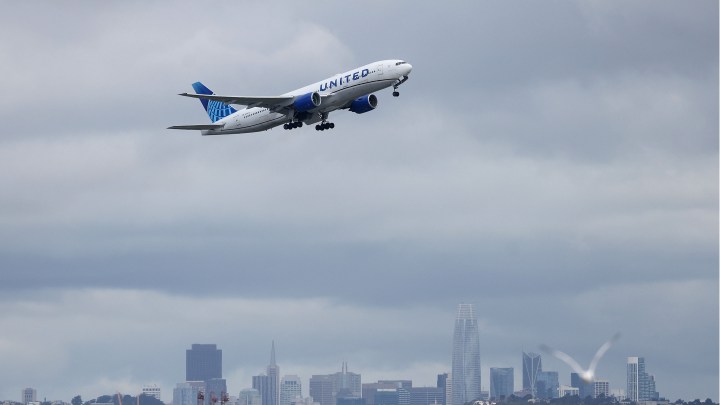
We’re starting to see a new normal for airlines

Airlines’ quarterly results are continuing to roll in. Delta and United have already reported, and we’ll hear from American and Southwest this week. So far, the headline is: Major airlines are reporting losses for the first three months of the year, but they say consumer demand is strong and they’re optimistic about a busy summer travel season ahead.
To parse this, “Marketplace Morning Report” host Sabri Ben-Achour spoke with Samuel Engel, senior vice president at ICF. Engel said this signals a “new normal” for airlines that involves rising costs for pilots and fuel, resilient leisure travel demand but lagging business travel. The following is an edited transcript of their conversation.
Sabri Ben-Achour: So firstly, why are these major airlines losing money?
Samuel Engel: What’s really going on is that costs are up. And the lucrative business travelers are not all back. The airlines have just agreed to a 34% pay increase for pilots led by Delta. So we have pilot costs going up, and we also have fuel costs. They’re still more than 50% higher than they were before the pandemic.
Ben-Achour: Despite all that, Delta and United are both saying people are still willing to spend on flying. Do you agree that we’re all going to be flying a bunch more this summer?
Engel: It’s important to talk about who’s going to be flying more this summer. It’s been pretty clear since early in the pandemic that people still want to go see Grandma, and they still want to go on vacation. And so the leisure demand, which had fallen off at the beginning of the pandemic, has fully recovered. What is not there is the same travel patterns for business travelers.
Ben-Achour: How important are business travelers to the airlines?
Engel: It’s the business travelers who buy those tickets just a few days before departure and easily pay twice as much as the leisure travelers. And what we’re seeing is that while business travel grew through 2022, the pace of that growth has tapered off in 2023.
Ben-Achour: Airfare prices, they’re higher than they were before the pandemic. Do you think that’s going to subside? Or is that the new normal?
Engel: You have to think about that as a new balance between business and leisure. So the way I think about it is that, for decades, leisure passengers have enjoyed an implicit subsidy from business. With the business traffic and the business value down, there is less of that subsidy to go around. And so we have seen the airlines learning to get leisure passengers to pay more. That’s not going away. We have been predicting for some time that in the face of those higher fares, leisure demand would fall off. And we haven’t seen it yet, but we certainly can expect it from the laws of supply and demand.
Ben-Achour: I ask this question as someone who did not have a single on-time flight last summer and who spent at least one night on a cot. Are the airlines going to be able to handle the leisure travel of this summer? Because, just to put it bluntly, it was hell. Travel was hell last summer.
Engel: On the peak travel days and when there are extreme weather events, which we see more often, the system is at a cracking point, and it simply has less give and less resilience for recovery than it used to. And that I think spells a continued challenge for passengers and the airlines this summer.
There’s a lot happening in the world. Through it all, Marketplace is here for you.
You rely on Marketplace to break down the world’s events and tell you how it affects you in a fact-based, approachable way. We rely on your financial support to keep making that possible.
Your donation today powers the independent journalism that you rely on. For just $5/month, you can help sustain Marketplace so we can keep reporting on the things that matter to you.

















